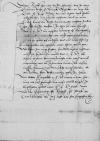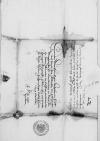 GStA PK, HBA, C1, No. 944, 1r
GStA PK, HBA, C1, No. 944, 1r
Durchlauchtiger, hochgeborner furst, hochgunstiger, lieber her und freundt. / Unsere freuntliche unnd vleiswillige dienste zuvoran. /
Wie wir uff E(uer) F(urstlichen) D(urchlauch)t cf. Albrecht I von Hohenzollern-Ansbach to Ioannes DANTISCUS Königsberg, 1543-10-27, CIDTC IDL 5082⌊schreibencf. Albrecht I von Hohenzollern-Ansbach to Ioannes DANTISCUS Königsberg, 1543-10-27, CIDTC IDL 5082⌋, zu Königsberg (Królewiec, Mons Regius, Regiomontium), city in Ducal Prussia, on the mouth of the Pregel (Pregoła) river, capital city of Ducal Prussia; today Kaliningrad in Russia⌊KonigsbergKönigsberg (Królewiec, Mons Regius, Regiomontium), city in Ducal Prussia, on the mouth of the Pregel (Pregoła) river, capital city of Ducal Prussia; today Kaliningrad in Russia⌋ den XXVII des negst vorschinnen Octobris ausgangen, / den letzten tag desselbten mondts widderumb cf. Ioannes DANTISCUS to Albrecht I von Hohenzollern-Ansbach Heilsberg (Lidzbark Warmiński), 1543-10-31, CIDTC IDL 5306⌊geantwurtcf. Ioannes DANTISCUS to Albrecht I von Hohenzollern-Ansbach Heilsberg (Lidzbark Warmiński), 1543-10-31, CIDTC IDL 5306⌋, / hat E(uer) F(urstliche) D(urchlauch)t, wie wirs achten, / vor irem auszoge / eingenommen, / dorzu wir mitler zeit / nicht haben nachgelassen zuvolziehen, / was dazumalh E(uer) F(urstliche) D(urchlauch)t von uns gefurdert, / weil wir solchs Royal Prussia (Prussia Regalis), region, part of Prussia annexed to the Kingdom of Poland in 1466 under the provisions of the Second Peace of Thorn⌊diesen landenRoyal Prussia (Prussia Regalis), region, part of Prussia annexed to the Kingdom of Poland in 1466 under the provisions of the Second Peace of Thorn⌋ und uns allen nottigk, / auch zu willen und wolgefallen zusein E(uer) F(urstlichen) D(urchlauch)t erkennen, / derwegenn mit etlichen herren Council of Royal Prussia the most important local authority in Royal Prussia. It consisted of two bishops (of Ermland (Warmia), who served as the Council’s president, and of Kulm (Chełmno)), three voivodes (of Kulm, Marienburg (Malbork), and Pomerania), three castellans (of Kulm, Elbing (Elbląg), and Gdańsk (Danzig)), three chamberlains (of Kulm, Marienburg, and Pomerania), and representatives of the three Great Prussian Cities – Gdańsk, Thorn (Toruń), and Elbing (ACHREMCZYK 2016, p. 17-18)⌊rethen dis koniglichs ortsCouncil of Royal Prussia the most important local authority in Royal Prussia. It consisted of two bishops (of Ermland (Warmia), who served as the Council’s president, and of Kulm (Chełmno)), three voivodes (of Kulm, Marienburg (Malbork), and Pomerania), three castellans (of Kulm, Elbing (Elbląg), and Gdańsk (Danzig)), three chamberlains (of Kulm, Marienburg, and Pomerania), and representatives of the three Great Prussian Cities – Gdańsk, Thorn (Toruń), and Elbing (ACHREMCZYK 2016, p. 17-18)⌋ uns schriftlich underredt, / wie dem vorzukommen were, / das Christian III of Oldenburg (*1503 – †1559), 1534-1559 King of Denmark and Norway, 1523-1559 Duke of Holstein and Schleswig; son of Frederick I of Oldenburg, King of Denmark, and his first consort, Anna of Brandenburg⌊konigliche wirde zu DennemarckenChristian III of Oldenburg (*1503 – †1559), 1534-1559 King of Denmark and Norway, 1523-1559 Duke of Holstein and Schleswig; son of Frederick I of Oldenburg, King of Denmark, and his first consort, Anna of Brandenburg⌋ vom haus Burgundien unbekriegt blieb, / und wir uns auch hie im lande derhalben keins unfuegs hetten zubefahren, / hyerinne bei uns befunden, / das imants unsers mittels, / also nemlich der edel, ernvhest h(err) Achatius von Zehmen (Achacy Cema) (*ca. 1485 – †1565), 1517-1531 Chamberlain of Pomerania, 1531-1546 Castellan of Gdańsk (Danzig), 1545-1546 Voivode of Kulm (Chełmno), 1546-1565 Voivode of Marienburg (Malbork) (SBPN 1, p. 194-195; ORACKI 1984, p. 38-39; Urzędnicy 5/2, p. 198; PSB 4, p. 325-326)⌊dantzker castellanAchatius von Zehmen (Achacy Cema) (*ca. 1485 – †1565), 1517-1531 Chamberlain of Pomerania, 1531-1546 Castellan of Gdańsk (Danzig), 1545-1546 Voivode of Kulm (Chełmno), 1546-1565 Voivode of Marienburg (Malbork) (SBPN 1, p. 194-195; ORACKI 1984, p. 38-39; Urzędnicy 5/2, p. 198; PSB 4, p. 325-326)⌋, / mit den ersten, / auch vor dem Diet of Poland ⌊reichs tage der CronDiet of Poland ⌋, / an Sigismund I Jagiellon (Zygmunt I) (*1467 – †1548), King of Poland and Grand Duke of Lithuania (1506-1548); Duke of Głogów (Glogau) (1499-1506), Duke of Opava (1501-1506), Governor of Silesia (1504-1506); son of King Kazimierz IV Jagiellon and Elisabeth of Austria⌊konigliche m(ajeste)tSigismund I Jagiellon (Zygmunt I) (*1467 – †1548), King of Poland and Grand Duke of Lithuania (1506-1548); Duke of Głogów (Glogau) (1499-1506), Duke of Opava (1501-1506), Governor of Silesia (1504-1506); son of King Kazimierz IV Jagiellon and Elisabeth of Austria⌋, unsern allergnedigsten herren, / wurde gefertigt. / Was der aber in unser aller nahmen vor ein instruction solt haben, / stelle wir in E(uer) F(urstlichen) D(urchlauch)t, die dieser hendel volkomner,  GStA PK, HBA, C1, No. 944, 1v dan wir wissenheit tragen, / hochbedencken, / die sich nicht wolde beschweren / uffs forderlichst iren willen, / rath und gut duncken zu diesen sachen, / domit sie hochgemelter Sigismund I Jagiellon (Zygmunt I) (*1467 – †1548), King of Poland and Grand Duke of Lithuania (1506-1548); Duke of Głogów (Glogau) (1499-1506), Duke of Opava (1501-1506), Governor of Silesia (1504-1506); son of King Kazimierz IV Jagiellon and Elisabeth of Austria⌊koniglicher m(ajeste)tSigismund I Jagiellon (Zygmunt I) (*1467 – †1548), King of Poland and Grand Duke of Lithuania (1506-1548); Duke of Głogów (Glogau) (1499-1506), Duke of Opava (1501-1506), Governor of Silesia (1504-1506); son of King Kazimierz IV Jagiellon and Elisabeth of Austria⌋ in gutem grunde vorgebracht mocht werden, / mitzuteilen. / Solchs hie bei den andern Council of Royal Prussia the most important local authority in Royal Prussia. It consisted of two bishops (of Ermland (Warmia), who served as the Council’s president, and of Kulm (Chełmno)), three voivodes (of Kulm, Marienburg (Malbork), and Pomerania), three castellans (of Kulm, Elbing (Elbląg), and Gdańsk (Danzig)), three chamberlains (of Kulm, Marienburg, and Pomerania), and representatives of the three Great Prussian Cities – Gdańsk, Thorn (Toruń), and Elbing (ACHREMCZYK 2016, p. 17-18)⌊hern rethenCouncil of Royal Prussia the most important local authority in Royal Prussia. It consisted of two bishops (of Ermland (Warmia), who served as the Council’s president, and of Kulm (Chełmno)), three voivodes (of Kulm, Marienburg (Malbork), and Pomerania), three castellans (of Kulm, Elbing (Elbląg), and Gdańsk (Danzig)), three chamberlains (of Kulm, Marienburg, and Pomerania), and representatives of the three Great Prussian Cities – Gdańsk, Thorn (Toruń), and Elbing (ACHREMCZYK 2016, p. 17-18)⌋ amptsweis uff E(uer) F(urstlichen) D(urchlauch)t vorgedacht schreiben, an uns gethan, / anzugeben / und weiter zufordern, / wolle wir E(uer) F(urstlichen) D(urchlauch)t, der gunst wir uns bevelhen, / zu gefelligen diensten kein vleis underlassen. /
GStA PK, HBA, C1, No. 944, 1v dan wir wissenheit tragen, / hochbedencken, / die sich nicht wolde beschweren / uffs forderlichst iren willen, / rath und gut duncken zu diesen sachen, / domit sie hochgemelter Sigismund I Jagiellon (Zygmunt I) (*1467 – †1548), King of Poland and Grand Duke of Lithuania (1506-1548); Duke of Głogów (Glogau) (1499-1506), Duke of Opava (1501-1506), Governor of Silesia (1504-1506); son of King Kazimierz IV Jagiellon and Elisabeth of Austria⌊koniglicher m(ajeste)tSigismund I Jagiellon (Zygmunt I) (*1467 – †1548), King of Poland and Grand Duke of Lithuania (1506-1548); Duke of Głogów (Glogau) (1499-1506), Duke of Opava (1501-1506), Governor of Silesia (1504-1506); son of King Kazimierz IV Jagiellon and Elisabeth of Austria⌋ in gutem grunde vorgebracht mocht werden, / mitzuteilen. / Solchs hie bei den andern Council of Royal Prussia the most important local authority in Royal Prussia. It consisted of two bishops (of Ermland (Warmia), who served as the Council’s president, and of Kulm (Chełmno)), three voivodes (of Kulm, Marienburg (Malbork), and Pomerania), three castellans (of Kulm, Elbing (Elbląg), and Gdańsk (Danzig)), three chamberlains (of Kulm, Marienburg, and Pomerania), and representatives of the three Great Prussian Cities – Gdańsk, Thorn (Toruń), and Elbing (ACHREMCZYK 2016, p. 17-18)⌊hern rethenCouncil of Royal Prussia the most important local authority in Royal Prussia. It consisted of two bishops (of Ermland (Warmia), who served as the Council’s president, and of Kulm (Chełmno)), three voivodes (of Kulm, Marienburg (Malbork), and Pomerania), three castellans (of Kulm, Elbing (Elbląg), and Gdańsk (Danzig)), three chamberlains (of Kulm, Marienburg, and Pomerania), and representatives of the three Great Prussian Cities – Gdańsk, Thorn (Toruń), and Elbing (ACHREMCZYK 2016, p. 17-18)⌋ amptsweis uff E(uer) F(urstlichen) D(urchlauch)t vorgedacht schreiben, an uns gethan, / anzugeben / und weiter zufordern, / wolle wir E(uer) F(urstlichen) D(urchlauch)t, der gunst wir uns bevelhen, / zu gefelligen diensten kein vleis underlassen. /
Ioannes Dantiscus (Johannes von Höfen, Ioannes de Curiis, Jan Dantyszek, Johannes Flachsbinder) (*1485 – †1548), eminent diplomat and humanist in the service of the Jagiellons, neo-Latin poet; 1530-1537 Bishop of Kulm; 1537-1548 Bishop of Ermland⌊IoannesIoannes Dantiscus (Johannes von Höfen, Ioannes de Curiis, Jan Dantyszek, Johannes Flachsbinder) (*1485 – †1548), eminent diplomat and humanist in the service of the Jagiellons, neo-Latin poet; 1530-1537 Bishop of Kulm; 1537-1548 Bishop of Ermland⌋, von Gottes gnaden bischoff zu Ermland (Warmia, Varmia), diocese and ecclesiastical principality in northeastern Poland, 1466-1772 within the Kingdom of Poland, Royal Prussia⌊ErmlanndtErmland (Warmia, Varmia), diocese and ecclesiastical principality in northeastern Poland, 1466-1772 within the Kingdom of Poland, Royal Prussia⌋. / Ioannes Dantiscus (Johannes von Höfen, Ioannes de Curiis, Jan Dantyszek, Johannes Flachsbinder) (*1485 – †1548), eminent diplomat and humanist in the service of the Jagiellons, neo-Latin poet; 1530-1537 Bishop of Kulm; 1537-1548 Bishop of Ermland⌊Io(an)nesIoannes Dantiscus (Johannes von Höfen, Ioannes de Curiis, Jan Dantyszek, Johannes Flachsbinder) (*1485 – †1548), eminent diplomat and humanist in the service of the Jagiellons, neo-Latin poet; 1530-1537 Bishop of Kulm; 1537-1548 Bishop of Ermland⌋ ep(iscou)s Varmien(sis)
ma(n)u
p(ro)pria
s(ubscrip)s(i)t
Postscript:
 GStA PK, HBA, C1, No. 944, 3r
GStA PK, HBA, C1, No. 944, 3r
Diesen brieff hat wir lassen schreiben, / das in eins Gdańsk Town Council ⌊ersamen raths zu DantzkeGdańsk Town Council ⌋ geschickter an uns, / der erbar h(err) Georg Möllner (Georg Möller, Jurgen Möllner) (*ca. 1495 – †1551), 1531 Gdańsk alderman; 1537 - town councillor; 1549 - burgrave (ZDRENKA 2, p. 217-218)⌊Jorge MollerGeorg Möllner (Georg Möller, Jurgen Möllner) (*ca. 1495 – †1551), 1531 Gdańsk alderman; 1537 - town councillor; 1549 - burgrave (ZDRENKA 2, p. 217-218)⌋, / den wir diesen tagk haben abgefertigt, / mit sich solt nehmen / und an Euer F(urstliche) D(urchlauch)t durch ein raths diener / under wegens indert het solt lassen tragen. / In dem sei wir bericht, / das E(uer) F(urstliche) D(urchlauch)t im negsten sontage zu Königsberg (Królewiec, Mons Regius, Regiomontium), city in Ducal Prussia, on the mouth of the Pregel (Pregoła) river, capital city of Ducal Prussia; today Kaliningrad in Russia⌊KonigsbergKönigsberg (Królewiec, Mons Regius, Regiomontium), city in Ducal Prussia, on the mouth of the Pregel (Pregoła) river, capital city of Ducal Prussia; today Kaliningrad in Russia⌋ ist ankommen, / des wir nicht wenig erfreuet, / so die in guter gesundtheit und mit ausrichtung nach willen irer geschefte / were heim gelanget, / weil dan im angezeigten handell / unsers achtens / nicht ist zuseinnen, / wolde uns E(uer) F(urstliche) D(urchlauch)t bei diesem unserm kammerjungen iren rath unnd meynung, / wie die instruction lauten solt, / lassen wissen, / dornach wir uns, / solchs vortzustellen, / bei den andern Council of Royal Prussia the most important local authority in Royal Prussia. It consisted of two bishops (of Ermland (Warmia), who served as the Council’s president, and of Kulm (Chełmno)), three voivodes (of Kulm, Marienburg (Malbork), and Pomerania), three castellans (of Kulm, Elbing (Elbląg), and Gdańsk (Danzig)), three chamberlains (of Kulm, Marienburg, and Pomerania), and representatives of the three Great Prussian Cities – Gdańsk, Thorn (Toruń), and Elbing (ACHREMCZYK 2016, p. 17-18)⌊hern rethenCouncil of Royal Prussia the most important local authority in Royal Prussia. It consisted of two bishops (of Ermland (Warmia), who served as the Council’s president, and of Kulm (Chełmno)), three voivodes (of Kulm, Marienburg (Malbork), and Pomerania), three castellans (of Kulm, Elbing (Elbląg), and Gdańsk (Danzig)), three chamberlains (of Kulm, Marienburg, and Pomerania), and representatives of the three Great Prussian Cities – Gdańsk, Thorn (Toruń), and Elbing (ACHREMCZYK 2016, p. 17-18)⌋ / wollen geflissen halten, / und bitten, so dieselbte E(uer) F(urstliche) D(urchlauch)t etwas neuer zeittung mit sich gebracht, / uns nicht wolde bergen. / In beigelegtem zedell wirt E(uer) F(urstliche) D(urchlauch)t haben, / was uns der hochwirdige her bischoff zu Plotzke, der Cron cantzler, den XII tagk dits hat zugeschrieben / etc.
 GStA PK, HBA, C1, No. 944, 1v dan wir wissenheit tragen, / hochbedencken, / die sich nicht wolde beschweren / uffs forderlichst iren willen, / rath und gut duncken zu diesen sachen, / domit sie hochgemelter
GStA PK, HBA, C1, No. 944, 1v dan wir wissenheit tragen, / hochbedencken, / die sich nicht wolde beschweren / uffs forderlichst iren willen, / rath und gut duncken zu diesen sachen, / domit sie hochgemelter 


